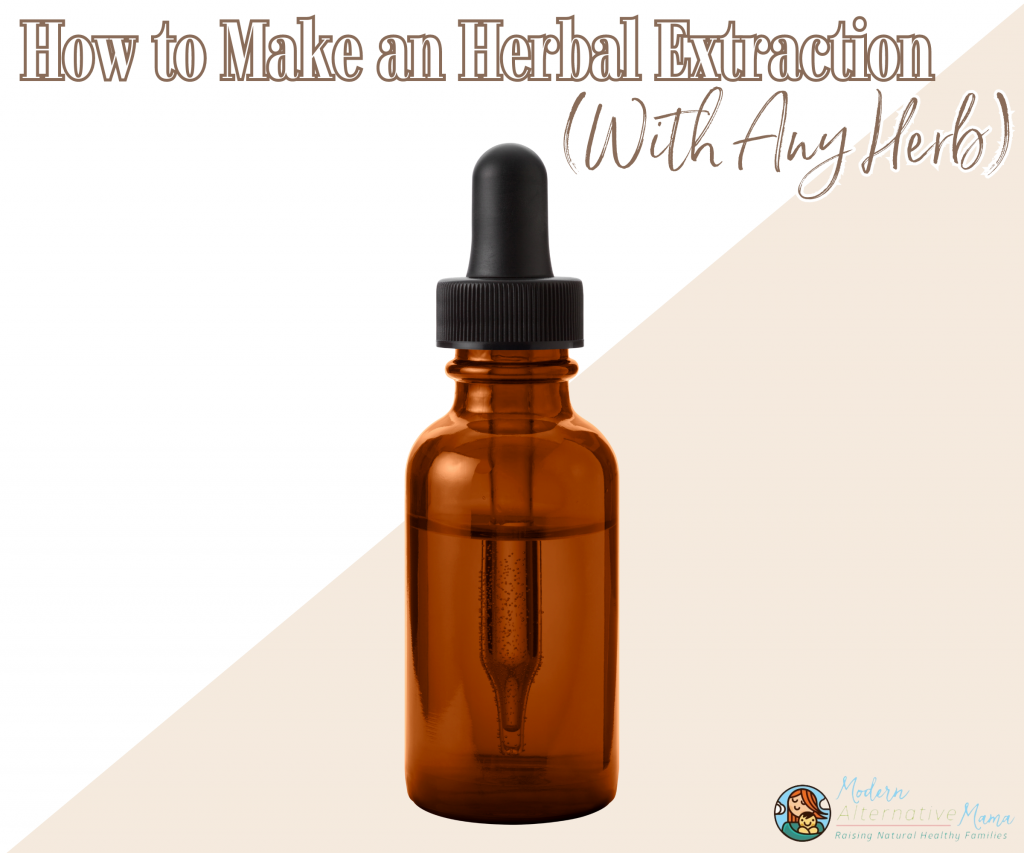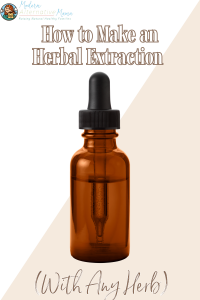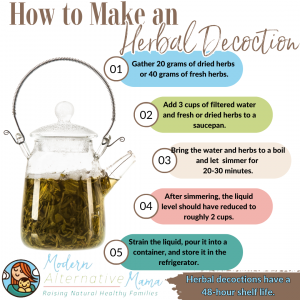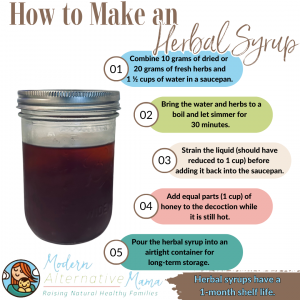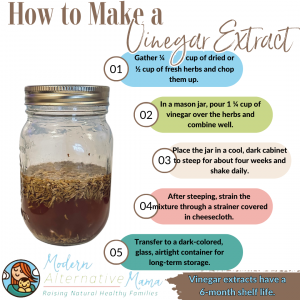As someone rather new to herbalism (an herbalist-in-training, if you will), the biggest struggle I’ve found is finding all the information in one place. I often find myself buried in books and bookmarking website after website just to find every resource has a different method of extracting herbal constituents.
As a newbie to herbalism, it can become overwhelming. There’s so much information and not enough time to read it all. Thankfully, I know a few amazing herbalists and have been able to ask questions without fear of judgment. I hope to share some of the knowledge I’ve learned from them. Hopefully, I can cut out some of the guesswork I went through for you.
First and foremost, my favorite herbal books are The Modern Herbal Dispensatory: A Medicine-Making Guide and the Encylopedia of Herbal Medicine. Those two books have been my biggest resources and are where much of this post’s information came from. I also really enjoyed reading Earthley’s guide, Introduction to Herbalism, and I cannot wait for the launch of their herbal course.
How to Make an Herbal Extraction
Herbal extracts and preparations have been used as medicine for thousands of years. An herbal extraction is a preparation that removes the raw phytochemicals from a plant, leaving behind their constituents. Plant constituents are responsible for the plant’s medicinal benefits and are drawn out using water, alcohol, glycerin, oil, or vinegar – not just extracting them but preserving them too. There are many herbal extraction methods, so let’s discuss them.
Water Extraction
Water extractions are the oldest and simplest extraction mediums. Water extractions include infusions and decoctions. Although these extraction methods are the simplest (and fastest), their shelf life is the shortest.
Infusions (or teas) are made by pouring boiling water over fresh or dried herbs and letting them steep for a certain timeframe (usually 10-15 minutes). Although teas are the fastest extraction method, they have the shortest shelf life – about 24 hours.
Decoctions are similar to infusions but still very different. Decoctions are made by bringing the herbs and water to a boil and letting them simmer for a certain timeframe (usually 20-30 minutes). Decoctions also have a very short shelf life but are still longer than infusions – about 48 hours.
Learn more about making infusions and decoctions in our blog, How to Make a Water Extraction (With Almost Any Herb).
Alcohol Extraction
Alcohol extractions are the most commonly used extraction method for medicine-making. Alcohol extracts, sometimes called tinctures, steep herbs in alcohol for 4-6 weeks to extract the medicinal constituents. This extraction method creates a concentrated, shelf-stable remedy, but there are two alcohol extraction methods.
Method one is made by soaking fresh or dried herbs in 70 or 80-proof alcohol for a certain timeframe (usually about 4-6 weeks). Tinctures can vary in potency, but most herbalists recommend a 1:5 ratio, meaning 1 part herb to 5 parts alcohol. Although this method is a bit lengthier, the shelf life is one of the longest – about two years.
Method two is the same as method one, but instead of precisely measuring each ingredient, you fill a jar, leaving at least 1-2 inches of head space before covering the herbs with alcohol. Similarly to method one, method two steeps for 4-6 weeks and has a two-year shelf life.
Alcohol extractions aren’t suitable for everyone. For instance, children who struggle with the taste or anyone who avoids alcohol for any reason (religion, recovery, health, etc.) may want to avoid alcohol-based tinctures. In those cases, one may choose an alcohol-free extraction method like glycerin, which we will discuss next.
Learn more about making tinctures in our blog, How to Make an Alcohol Extraction (With Almost Any Herb).
Glycerin Extraction
Glycerin is a less frequently used extraction medium but is growing in popularity. Glycerin extractions, also known as glycerites (or tinctures), are a little similar to alcohol extracts, and again, there are two methods.
Method one is the most common glycerin extraction method. This method uses a double-broiler method to simmer fresh or dried herbs in a mixture of glycerin and water for a certain timeframe (usually 2-3 hours). This method creates something similar to decoctions but is more potent because of the glycerin. Method one is said to be more effective (and faster) than the second method, but they both have the same shelf life – about two years.
Method two is very similar to alcohol extractions and is made by soaking fresh or dried herbs in glycerin and water (instead of alcohol) for a certain amount of time (usually 4-6 weeks). This method, like an alcohol extraction, should follow the 1:5 ratio. Some herbalists use a 1:3 or 1:4 ratio for harder herbs like roots. Method two, like method one, has a two-year shelf life.
Glycerin can replace alcohol in alcohol extractions. Glycerin is commonly used for children who struggle with the taste of traditional alcohol tinctures or when simply avoiding alcohol. Since there is no alcohol in glycerin extractions, they generally taste sweeter and are easier to take.
However, there are a few downfalls with glycerin extractions. First and foremost, even following the 1:5 ratio, glycerin-based tinctures are usually not as potent, so larger doses may be required. Secondly, glycerin-based tinctures must be heated up for proper extraction, making this method a little lengthier than an alcohol extraction.
Learn more about glycerin extractions in our blog, How to Make a Glycerin Extraction (With Almost Any Herb).
Herbal Syrup
Herbal syrups combine infusions (or decoctions) with equal parts honey or sugar to extract and preserve fresh or dried herbs. When making herbal syrup, honey or sugar is used as a preservative, so sugar alternatives like stevia or monk fruit will not work. Still, we do discuss alternatives in our herbal syrup blog mentioned below.
Herbal syrups are great for children; they’re sweet and disguise bitter-tasting herbs. Herbal syrups are thicker than the other extraction methods, making them ideal for sore throats and coughs as they coat the throat. Herbal syrups typically last about a month in the refrigerator.
Learn more about making herbal syrups in our blog, How to Make an Herbal Syrup (With Almost Any Herb).
Oil Extraction
Oil extractions are made by soaking dried herbs in oil and heating them to extract their constituents. Oil extractions are often the first step to creating topical creams, ointments, and massage oils (although this doesn’t work for all herbs). Sometimes, oil infusions serve as a functional food in recipes. There are two oil extraction methods – hot infusions and cold infusions.
Hot-infused oil is the most common oil extraction method because it’s the fastest. This method uses a double-broiler method to simmer dried herbs in oil for a certain timeframe (usually 2-3 hours). Although hot infusions have a one-year shelf life, they perform most optimally when fresh.
Cold-infused oils are made by soaking dried herbs in oil for a certain timeframe (usually 4-6 weeks). Many believe the best method for making cold-infused oils is to keep them on a windowsill for sunlight. Sunlight warms the herbs slowly (like the hot-infused oil method) and encourages the release of herbal constituents. Others prefer to steep their herbs in a cool, dark place. I prefer the sunlight method because it makes the most sense to me. Whichever cold-infused oil method you use will yield a product with a one-year shelf life.
When making oil extractions, some people add essential oils to them. Adding essential oils can add medicinal or preservative benefits. If you wish to add essential oils to your oil extraction, practicing essential oil safety is important.
Learn more about making oil infusions in our blog, How to Make an Oil Extraction (With Almost Any Herb).
Vinegar Extraction
Vinegar extractions (or vinegar infusions) aren’t as popular because they’re a bit different than all the other extraction methods mentioned. Unlike the other extraction methods mentioned, vinegar infusions extract minerals instead of herbal constituents. The extraction process of acidic vinegar makes them less ideal for medicinal purposes and more ideal for functional foods.
Vinegar extractions are very similar to alcohol extractions and are made by soaking fresh or dried herbs in vinegar for a certain timeframe (usually about four weeks). Vinegar extractions, like alcohol, should follow the 1:5 ratio. Some herbalists use a 1:3 or 1:4 ratio for harder herbs like roots. Unlike an alcohol extraction with a two-year shelf life, vinegar extractions have a six-month shelf life.
Vinegar extractions aren’t as popular for a few other reasons. Firstly, vinegar isn’t a great solvent for most herbal constituents. Secondly, some people find vinegar’s taste overwhelming, making it harder to take. These two reasons, combined with a shorter shelf life, make many prefer alcohol or glycerin extractions.
Learn more about making vinegar infusions in our blog, How to Make a Vinegar Extraction (With Almost Any Herb).
Whether you’re a newbie or a seasoned herbalist, I hope this post was able to answer questions you may have had. Remember, herbalism isn’t all or nothing; every herbalist doesn’t look the same. It is okay to start slow, at your own speed, and figure out what works for you. Trial and error is the key, but hopefully, this post takes away most of the errors and leaves you with plenty of successful herbal remedies. Either way, with practice (and time), you’ll be making herbal remedies for everyone in your life in no time.

